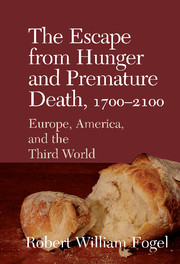Book contents
- Frontmatter
- Contents
- List of Figures
- List of Tables
- Preface
- Acknowledgments
- 1 The Persistence of Misery in Europe and America before 1900
- 2 Why the Twentieth Century Was So Remarkable
- 3 Tragedies and Miracles in the Third World
- 4 Prospects for the Twenty-First Century
- 5 Problems of Equity in Health Care
- Postscript: How Long Can We Live?
- Appendix
- Notes
- Glossary of Technical Terms
- Biographical Notes
- References
- Index
- Cambridge Studies in Population, Economy and Society in Past Time
3 - Tragedies and Miracles in the Third World
Published online by Cambridge University Press: 05 June 2012
- Frontmatter
- Contents
- List of Figures
- List of Tables
- Preface
- Acknowledgments
- 1 The Persistence of Misery in Europe and America before 1900
- 2 Why the Twentieth Century Was So Remarkable
- 3 Tragedies and Miracles in the Third World
- 4 Prospects for the Twenty-First Century
- 5 Problems of Equity in Health Care
- Postscript: How Long Can We Live?
- Appendix
- Notes
- Glossary of Technical Terms
- Biographical Notes
- References
- Index
- Cambridge Studies in Population, Economy and Society in Past Time
Summary
The debate over the extent of chronic malnutrition in developing countries, which began after World War II, has been conducted largely between investigators associated with the Food and Agriculture Organization (FAO), the World Health Organization (WHO), and the World Bank, on the one hand, and critics who believe that their estimates of the extent of malnutrition are too high. I will use the acronym FAWOB to designate the investigators associated with these three organizations.
Few investigators have suggested that the FAWOB estimates are too low. One reason for the neglect of this possibility is the tendency of investigators to assume explicitly or implicitly that affluent persons in affluent countries reached their genetic potential during the middle decades of the twentieth century and that no further improvements in physiology were possible without some major genetic breakthrough. In Chapter 2, I outlined a theory of technophysio evolution that disputes that assumption. Next, I want to apply the theory of technophysio evolution to a number of problems related to health and mortality in the Third World.
Changing Views of Chronic Malnutrition and of the Methods of Measuring it
Nutritional science was still in its infancy during the early twentieth century. It was not until the turn of the century that Wilbur O. Atwater and his collaborators estimated the energy requirements of basal metabolism.
- Type
- Chapter
- Information
- The Escape from Hunger and Premature Death, 1700–2100Europe, America, and the Third World, pp. 43 - 65Publisher: Cambridge University PressPrint publication year: 2004



